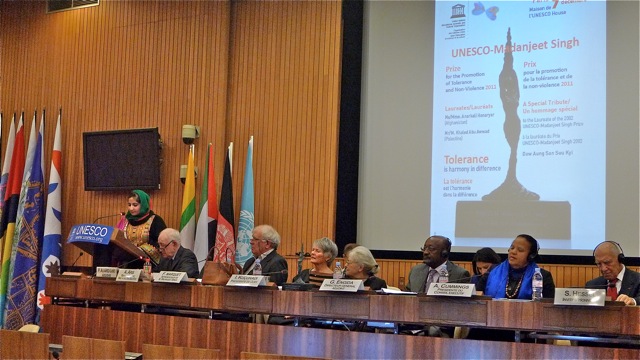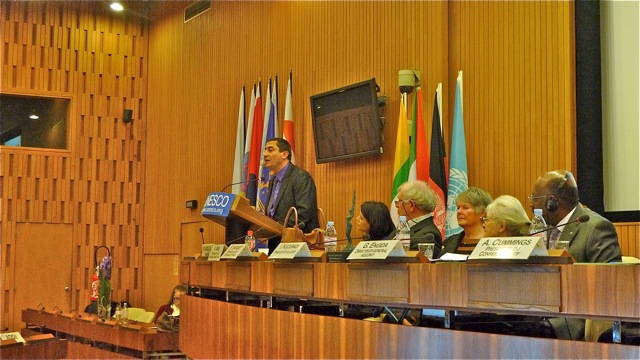UNESCO Prize Award ceremony
Video address by Mr. Madanjeet Singh on the occasion of the award ceremony of the 2011 UNESCO-Madanjeet Singh Prize for the Promotion of Tolerance and Non-Violence at UNESCO House, Paris, on 9 December 2011.
Madam Director-General Irina Bokova, your excellences, ladies and gentlemen,
This is an unprecedented occasion for rejoicing as the UNESCO-Madanjeet Singh Prize for the Promotion of Tolerance and Non-Violence is awarded for the first time by a very distinguished woman director-general of UNESCO. It is a special occasion also because since the UNESCO Executive Board established the Prize in 1995, the laureates have been mostly women.
In 1996, the jury chaired by the Nobel Peace laureate, Archbishop Desmond Tutu - Chairman of South African Reconciliation Committee - awarded the Prize to a Rwandan group of 32 women’s NGOs, Pro-femmes Twese Hamwe, meaning “all together”. Their dedicated “Action Campaign” greatly benefited the widows and orphans who had survived the horrendous genocide committed by Rwanda’s Hutu majority in which about a million men, women and children belonging to Tutsi minority were brutally massacred in April 1994. Having concurrently served as ambassador to Rwanda and Burundi while I was the high commissioner of India in Uganda, I was pleased with the award.
The 1998 Prize was awarded to a Pakistani group of some 30 women organizations, the Joint Action Committee for People’s Rights (JAC), a coalition fighting against religious intolerance and promoting human rights in Pakistan. The Prize was shared with an Indian laureate Narayan Desai for his devoted work to spread Mahatma Gandhi’s vision of Gram Swaraj (village Panchayat), and friendship between India and Pakistan.
I am especially glad that Aung San Suu Kyi has finally been allowed by the new government of Burma to accept the UNESCO Prize after a decade since it was awarded to her in 2002. It is measure of the greatness of this valiant apostle of democracy, non-violence and tolerance that she has transcended her agonizing ordeal by reconciliation with her tormentors, the military dictators who assassinated her father Bogyoke Aung San and then imprisoned her for over 15 years after her National League for Democracy party won the general election in 1990. Her recent decision to rejoin the political process without compromising her democratic principles and ideals is a happy augury in the interest of her country’s future. I believe that in wishing her all success, I am articulating your sentiments as well.
The Bangladeshi writer Taslima Nasreen is another exceptionally brave woman and an embodiment of Bengali secular culture. She received repeated standing ovations during the 2004 Prize award ceremony as she said, “With my country’s strong patriarchal tradition, women suffer unbearable inequalities and injustices. They are considered intellectually, morally, physically and psychologically inferior by religion, tradition, culture and customs. As a result, the Islamic fundamentalists refuse to tolerate any of my views”.
The bigots could not tolerate Taslima’s views that the religious scriptures are out of time and out of place. They were upset that religious laws that discriminate against women, need to be replaced by secular law and a unified civil code. Hundreds of thousands of extremists demonstrated in the streets and demanded her execution by beheading or by hanging.
It is against this backdrop that the award of the 2011 Prize to Anarkali Kaur Honaryar acquires special significance. She has been recognized for her courageous human rights activities to help Afghan women who suffer from intolerance, domestic abuse, forced marriages and gender discrimination. She is the only non-Muslim senator in Afghanistan’s Parliament. Anarkali belongs to the miniscule Sikh community in the Islamic Republic of Afghanistan and advocates the cause of the religious minorities where Al-Qaeda and Taliban terrorists have wrought havoc and kill people who do not conform to their fascist dogmas.
The UNESCO Director-General Mme Irina Bukova wisely accepted the recommendations of the international jury that Anarkali Honaryar share the Prize with Khaled Abu Awwad, a Palastinian human rights activist. He is a prominent leader in the reconciliation process with the aim of breaking the cycle of violence in which Palestinians and Israelis are trapped.
In this political scenario, the admission of Palestine as a member state of UNESCO is another important step in the direction of regional stability and peace. And I must heartily congratulate Mme Irina Bokova for having promptly accepted the majority decision adopted by the UNESCO Executive Board.
Lastly but not the least, may I thank you for attending this function in such large numbers which is indicative of your valuable support for UNESCO’s ideals and objectives to promote worldwide peace.
Thank you once again.
Madanjeet Singh
UNESCO Goodwill Ambassador
Founder, South Asia Foundation

Anarkaly Honaryar from Afghanistan , laureate of the UNESCO Madanjeet Singh prize for the Promotion of Tolerance and Non-Violence. 2011

Mr Khaled Abu Awwad from Palestine, laureate of the UNESCO Madanjeet Singh prize for the Promotion of Tolerance and Non-Violence. 2011
3.30 p.m.: Entrance of the public (7, place de Fontenoy)
3.55 p.m.: Arrival of the laureates and honorary guests
4 p.m.: Video Message from Mr César Lopez, participant of the 7th UNESCO’s Youth Forum from Colombia
AWARD CEREMONY OF THE 2011 PRIZE
Addresses by:
- Ms Ioanna Kuçuradi, President of the International Jury of the UNESCO-Madanjeet Singh Prize for the Promotion of Tolerance and Non-Violence, on behalf of the Jury
- Mr Getachew Engida, Deputy Director-General of UNESCO Award of the Prize Acceptance speeches by:
- Ms Anarkali Honaryar, Laureate of the 2011 UNESCO- Madanjeet Singh Prize for the Promotion of Tolerance and Non- Violence
- Mr Khaled Abu Awwad, Laureate of the 2011 UNESCO- Madanjeet Singh Prize for the Promotion of Tolerance and Non- Violence
Video Address by Mr Madanjeet Singh, UNESCO Goodwill Ambassador, founder of the UNESCO-Madanjeet Singh Prize for the Promotion of Tolerance and Non-Violence
TRIBUTE TO DAW AUNG SAN SUU KYI, LAUREATE OF THE 2002 UNESCO-MADANJEET SINGH PRIZE FOR THE PROMOTION OF TOLERANCE AND NON-VIOLENCE
Video Message from the Director-General of UNESCO Ms Irina Bokova
Video Message from Daw Aung San Suu Kyi, Laureate of the 2002 UNESCO-Madanjeet Singh Prize for the Promotion of Tolerance and Non-Violence Video Message from Mr Madanjeet Singh
Address by Ms Alissandra Cummins, Chairperson of the Executive Board of UNESCO
Message from Mr Boutros Boutros-Ghali, Secretary-General of the United Nations (1992 – 1996), President of the National Human Rights Council of Egypt, President of the UNESCO’s International Panel on Democracy and Development
Video Message from Ms Leila Zerrougui, Deputy Special Representative of the Secretary-General of the United Nations for the Democratic Republic of Congo and Deputy Head of the United Nations Organization Mission in the Democratic Republic of the Congo
Video Message from Mr Paulo Sérgio Pinheiro, Commissioner from Brazil and Rapporteur on the rights of children at the Inter- American Commission on Human Rights, Organization of the American States (OAS, Washington, DC.), the United Nations Special Rapporteur on Myanmar (2000-2008)
Address by Mr Stéphane Hessel, Laureate of the 2008 UNESCO- Bilbao Prize for the Promotion of a Culture of Human Rights













 Read more about "UNESCO"...
Read more about "UNESCO"... 